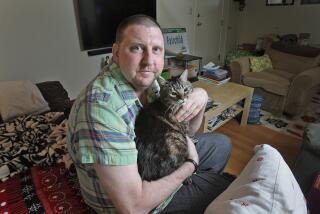Home, Doctor Tell of Fears as Right-to-Die Trial Opens
- Share via
The so-called right-to-die case of Anna Hirth, a comatose 92-year-old La Mesa resident whose daughter wants her removed from life-sustaining medical care, went to trial Monday in Superior Court in El Cajon.
Her daughter, Helen Gray of Calabasas Park--one of four Hirth children still alive--insists that her mother would not wish to be kept alive in her present state. Hirth’s doctor and the nursing home where she is being cared for object to Gray’s request.
It was clear from the testimony Monday at the non-jury trial being held before Superior Court Judge Milton Milkes that both the physician, Dr. Allen Jay, and the operators of the nursing home, Hacienda de La Mesa, are deeply concerned about possible professional and legal repercussions should Hirth be allowed to die.
Jay said he would ask Hirth’s conservator to find another doctor should the court order medication and food, now passed through Hirth’s nose, withheld. Without food or medicine, Hirth would probably starve in less than a week or suffer heart failure, Jay said.
Pressed to evaluate his misgivings by Richard Scott, a noted right-to-die lawyer from Santa Monica who is representing Gray, Jay said the “medical impropriety” of intentionally ending Hirth’s life carries the greatest weight.
Similarly, Sig Diener, administrator of the nursing home, said he and his staff “don’t want to become liable” should they be ordered to stop feeding Hirth and giving her medicine. But Diener, like Jay, said his apprehension is based on generalized beliefs rather than on specific guidelines or statutes.
It is the lack of such specifics, Diener said, that places him in a situation in which “we don’t know how to proceed.”
One apparent sign Monday of the importance of the Hirth case was that, for most of the day, the attorneys--representing an array of parties from the State of California and San Diego County to the nursing home and Hirth’s court-appointed attorney--outnumbered the spectators in the spacious courtroom.
As she has done for almost a year, Gray described her mother as a strong-willed, independent-minded woman who would find her current situation “abhorrent” and would want to die in a dignified manner.
Earlier, when Hirth was healthy, she toured various convalescent hospitals and did volunteer work at another. “I’d rather be dead than living there,” Gray said her mother told her after one such visit.
According to Jay’s testimony, Hirth is now in a state he described as “stuporous to semi-comatose.” She can at times open her eyes and follow light or loud voices, he said, but he does not know whether those are simply reflex actions. What is clear, he testified, is that she suffers from severe brain damage.
“I can’t say whether she’ll significantly improve in the future or not . . . or deteriorate rapidly. . . . I can’t determine that,” Jay said.
Hirth has had Alzheimer’s disease for several years and needed a full-time housekeeper-attendant. In February, 1986, she choked on some food, which caused her to stop breathing for several minutes. Paramedics revived her, but she never regained consciousness.
After leaving the hospital, she was admitted to the nursing home. Diener testified that he would not have permitted her admittance had he known there would be an effort to let her die.
When Jay refused a request by Gray that he take steps to allow her to die, Gray contacted Scott, who also represents Elizabeth Bouvia, a 29-year-old Los Angeles-area woman with cerebral palsy who last year won the right to refuse force-feeding.
After a lengthy hearing last month, Milkes denied Scott’s request to order Hirth’s feeding tube removed, instead ordering a trial.
The trial resumes at 9:15 a.m. today, when final arguments are expected.
More to Read
Sign up for Essential California
The most important California stories and recommendations in your inbox every morning.
You may occasionally receive promotional content from the Los Angeles Times.












